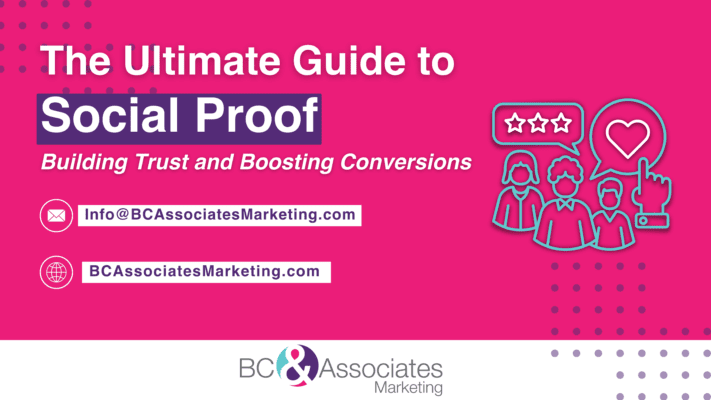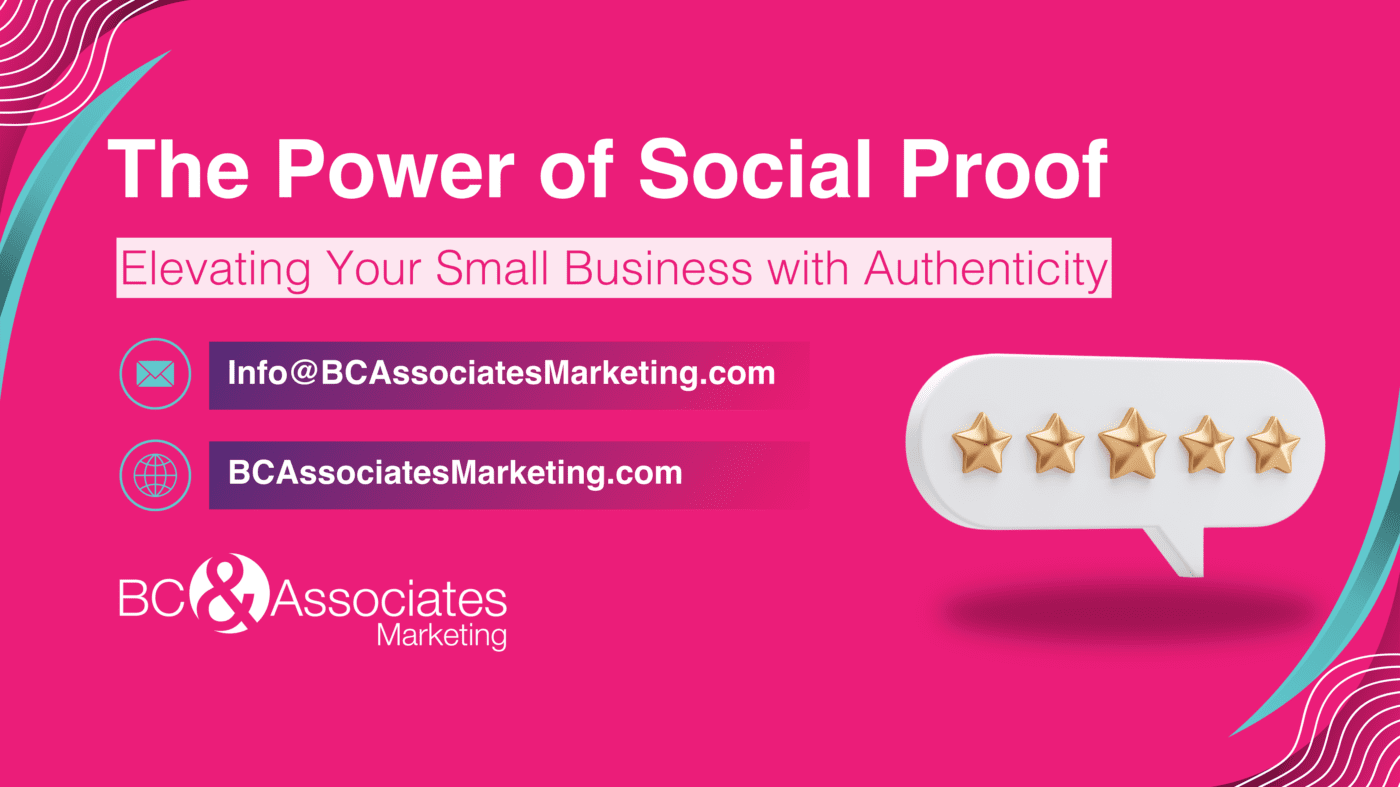In today’s digital landscape, where consumers are bombarded with endless options and choices, establishing trust and credibility is paramount for small businesses. Enter social proof – a powerful psychological phenomenon that can significantly influence purchasing decisions and drive customer loyalty. In this comprehensive guide, we’ll delve into the importance of social proof for small businesses, explore how to integrate it into your marketing strategy effectively and uncover best practices while avoiding common pitfalls.
What is Social Proof?
Social proof is a powerful psychological concept rooted in the human need for validation and social acceptance. Essentially, it’s the idea that people tend to follow the actions of others when they are uncertain about the correct course of action. In other words, it must be the right thing to do if others are doing something.
This phenomenon can be observed in various aspects of life, from consumer behavior to decision-making processes. Social proof plays a crucial role in influencing purchasing decisions and shaping brand perceptions in business and marketing.
Social proof can take many forms, including:
- Customer Testimonials: Positive feedback and testimonials from satisfied customers serve as endorsements of your products or services, helping to build trust and credibility with potential buyers.
- Online Reviews: Reviews on platforms such as Google, Yelp, and Amazon provide valuable feedback from real customers, influencing the opinions of others and impacting purchasing decisions.
- Case Studies: Detailed case studies that highlight successful outcomes and real-life experiences demonstrate the effectiveness and reliability of your offerings, reassuring potential customers.
- Influencer Endorsements: Endorsements from influencers or industry experts can lend credibility to your brand and expand your reach to their followers.
- Social Media Engagement Metrics: Likes, shares, comments, and follower counts on social media platforms indicate social validation, signaling to others that your brand is popular and trusted.
By effectively leveraging social proof, businesses can establish trust, credibility, and authority within your target audience, ultimately driving customer acquisition and retention.
Why is Social Proof Important for Small Businesses?
- Boosts Credibility and Trust: In today’s digital age, consumers rely heavily on online reviews and testimonials when purchasing. According to a survey by BrightLocal, 87% of consumers read online reviews for local businesses, with 79% trusting them as much as personal recommendations. Positive reviews and testimonials act as powerful endorsements, validating your business’s credibility and building trust with potential customers.
- Influences Purchasing Decisions: Research by Spiegel Research Center revealed that displaying reviews can increase conversion rates by up to 270%. When consumers see others endorsing your products or services, they’re more likely to perceive them positively and make a purchase. Social proof significantly impacts the buyer’s journey, influencing decisions at various stages, from consideration to conversion.
- Builds Brand Authority: Social proof can help position your small business as an authority in your industry. You can strengthen your reputation and stand out from competitors by showcasing satisfied customers, industry experts, or influencers who endorse your brand. When consumers see that others trust and endorse your business, they’re more likely to view you as a credible and reliable choice.
Social proof is crucial in building credibility, influencing purchasing decisions, and establishing brand authority for small businesses. By effectively leveraging social proof, businesses can enhance their reputation, attract more customers, and drive growth and success.
Social Proof Is NOT YOU talking about you!
Social proof holds significant power in influencing consumer behavior precisely because it involves others talking about your business rather than you talking about yourself. Here’s why social proof is more impactful:
- Third-Party Validation: When others share positive experiences or endorse your products or services, it serves as third-party validation. Potential customers perceive this as more genuine and trustworthy than self-promotion, which is inherently biased.
- Relatability and Authenticity: Social proof creates relatability and authenticity by showcasing real experiences from real people. This authenticity resonates with consumers on a deeper level, as they can relate to the experiences of others and trust their opinions.
- Psychological Influence: Social proof taps into psychological principles such as conformity and the bandwagon effect. Humans are social beings wired to follow the actions of others, especially in uncertain situations. Seeing others engage with your business signals to potential customers that it’s a safe and popular choice.
- Reduced Perceived Risk: Positive social proof reduces the perceived risk of trying out a new product or service. When consumers see others enjoying your offerings, they feel more confident purchasing, knowing they will likely have a positive experience.
- Increased Credibility and Authority: Social proof enhances credibility and authority within your industry or niche. It demonstrates that your business is reputable and trustworthy, as evidenced by the positive feedback and endorsements from satisfied customers or influential figures.
Social proof is a potent marketing tool because it leverages the power of social influence and human psychology to build trust, credibility, and authenticity around your brand. By harnessing the voices of your satisfied customers and advocates, you can amplify your message and attract new customers more effectively than through traditional self-promotion.
How to Integrate Social Proof into Your Marketing Strategy
Integrating social proof into your marketing strategy can significantly enhance your brand’s credibility and influence potential customers’ purchasing decisions. Here are some effective ways to incorporate social proof into your marketing efforts:
- Collect Customer Testimonials: Contact satisfied customers and ask them to share their positive experiences with your products or services. Display these testimonials prominently on your website, social media profiles, and marketing materials to showcase the value you provide.
- Encourage Online Reviews: Actively encourage your customers to leave reviews on popular review platforms such as Google My Business, Yelp, and Facebook. Make it easy for satisfied customers to share their feedback by providing direct links and gentle reminders after their purchase or interaction with your brand.
- Showcase User-Generated Content: Share photos, videos, and testimonials created by your customers on your social media channels. User-generated content adds authenticity to your brand and provides social proof of real-life experiences with your products or services.
- Partner with Influencers: Collaborate with influencers or industry experts who align with your brand values and target audience. Their endorsements can help amplify your brand’s message and credibility, especially among their followers who trust their opinions and recommendations.
By incorporating these strategies into your marketing plan, you can leverage social proof to build trust with your audience and drive engagement and conversions for your small business.
Best Practices for Leveraging Social Proof
- Being authentic is crucial when leveraging social proof to build credibility for your small business. Avoid fabricating or exaggerating social proof, as this can damage your reputation and erode trust with your audience. Instead, focus on showcasing genuine feedback and experiences from satisfied customers.
- Diversifying your social proof sources can also enhance your brand’s credibility. Utilize a variety of social proof formats, including customer reviews, testimonials, case studies, and social media engagement metrics. This demonstrates to potential customers that others have had positive experiences with your products or services across different channels.
It’s essential to monitor and respond to social proof effectively. Stay engaged with online reviews and social media conversations related to your brand. Respond promptly to positive and negative feedback, showing that you value customer input and are committed to addressing their concerns. This proactive approach demonstrates transparency and reinforces trust with your audience.
Common Mistakes to Avoid
1. Ignoring Negative Feedback:
Negative reviews and feedback can offer valuable opportunities for growth and improvement. Instead of dismissing or ignoring them, embrace them as learning experiences. Addressing negative feedback transparently demonstrates your commitment to customer satisfaction and can help turn dissatisfied customers into loyal advocates. Actively engaging with criticism and resolving issues, you value customer feedback and are dedicated to continuous improvement.
How to respond to Negative Reviews:
While many businesses focus solely on collecting positive reviews, negative feedback can be valuable. Addressing negative reviews transparently and proactively can showcase your commitment to customer satisfaction and help build trust with potential customers. Responding to negative reviews is critical to managing your online reputation and demonstrating your commitment to customer satisfaction. Here are some steps to effectively respond to negative reviews:
- Stay Calm and Professional: When faced with a negative review, your response must be calm and professional. Avoid reacting emotionally or defensively, as this can escalate the situation and reflect poorly on your business.
- Thank the Reviewer: Start by thanking the reviewer by name for their feedback, regardless of the nature of the review. Gratitude demonstrates that you value their input and are committed to addressing their concerns.
- Acknowledge the Issue: Acknowledge the specific issues raised in the review and assure the reviewer that their feedback has been heard. Empathize with their experience and offer understanding without apologizing; doing so can be seen as accepting blame.
- Provide a Solution: Offer a solution or resolution to address the reviewer’s concerns. Depending on the nature of the issue, this could involve offering a refund, a replacement product or service, or simply an assurance that steps will be taken to prevent similar issues.
- Take the Conversation Offline: Encourage the reviewer to contact you directly to discuss and resolve the issue privately. Providing a contact email or phone number demonstrates your willingness to address their concerns personally and shows other potential customers that you take customer feedback seriously.
- Follow-Up: Once you’ve addressed the reviewer’s concerns, follow up with them to ensure they are satisfied with the resolution. This demonstrates your commitment to customer satisfaction and can help turn a negative experience into a positive one.
2. Overlooking User-Generated Content:
User-generated content, such as photos, videos, and testimonials from satisfied customers, is a powerful form of social proof. Don’t underestimate its impact on building credibility and trust with your audience.
Encouraging user-generated content can be a powerful strategy to boost social proof for your business. Here are some effective ways to inspire your customers to create and share content:
- Run Contests or Challenges: Organize contests or challenges where customers can submit photos, videos, or testimonials showcasing their experiences with your products or services. Offer enticing prizes or incentives to encourage participation.
- Create Branded Hashtags: Develop a unique branded hashtag and encourage customers to use it when posting about their interactions with your brand on social media platforms. This helps aggregate user-generated content and makes it easier for you to track and repost.
- Share Customer Stories: Highlight customer success stories or testimonials on your website, blog, or social media channels. When customers see others sharing their positive experiences, they’re more likely to contribute their content.
- Offer Rewards or Discounts: Reward customers who create and share content about your brand with exclusive discounts, loyalty points, or special offers. This will incentivize participation and strengthen customer loyalty.
- Feature User Content: Showcase user-generated content on your website, social media profiles, or marketing materials. You demonstrate that you value and appreciate your customers’ contributions by featuring customer photos, reviews, or testimonials.
- Host User Spotlight Interviews: Interview satisfied customers or brand advocates and share their stories on your blog or social media channels. This provides valuable social proof, humanizes your brand, and fosters a sense of community.
- Create Interactive Experiences: Develop interactive campaigns or experiences that encourage customers to engage with your brand creatively. This could include photo challenges, quizzes, or interactive polls that prompt users to share their results or experiences.
Bonus Tips
- Engage with User Content and show appreciation for user-generated content by liking, commenting, or reposting it on your social media channels. This acknowledges your customers’ efforts and encourages others to contribute.
- Provide Clear Guidelines: Make it easy for customers to understand how they can contribute content and what type of content you’re looking for. Provide clear guidelines, examples, and instructions to ensure consistency and quality.
- Cultivate a Community: Foster a sense of community among your customers by creating forums, Facebook groups, or online communities where they can connect, share experiences, and support each other. A strong community encourages organic content creation and sharing.
Implementing these strategies can effectively encourage user-generated content and harness its power to enhance social proof for your small business. Leveraging user-generated content can add authenticity to your brand and amplify the voices of your satisfied customers, ultimately strengthening your social proof and brand reputation.
Social Proof is the Way!
In conclusion, social proof is a potent tool for small businesses looking to build credibility, influence purchasing decisions, and establish themselves as industry leaders. By authentically and strategically integrating social proof into your marketing strategy, you can enhance your brand’s reputation, attract new customers, and foster long-term loyalty.
Read our Blog, The Ultimate Guide to Social Proof Building Trust and Boosting Conversions

At BC & Associates Marketing, we’re here to help you implement these strategies and unlock your business’s full potential. Don’t wait—schedule your 15-minute fit call with us today, and let’s make every moment count!
Discover the BC & Associates Marketing Resources Hub—your key to unlocking the secrets of small business marketing success. This comprehensive hub meets your unique learning preferences. Dive into a world of marketing insights, strategies, and expert tips designed to help you navigate the complexities of growing your business in today’s competitive landscape. With BC & Associates at your side, you’re not just staying informed—you’re staying ahead.


